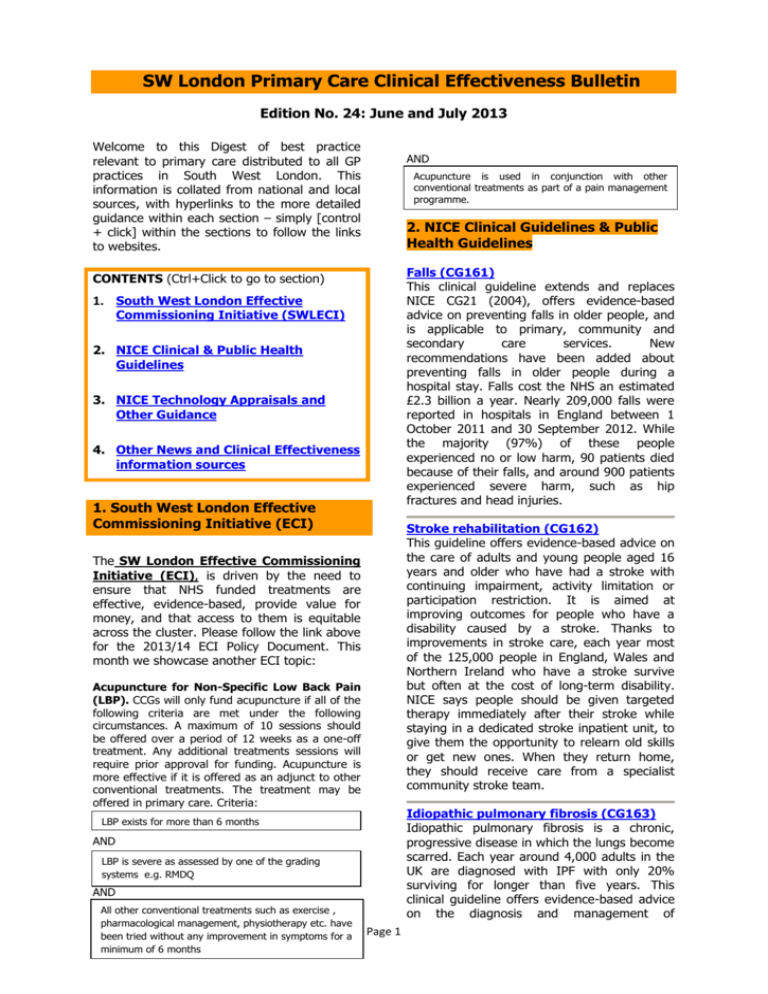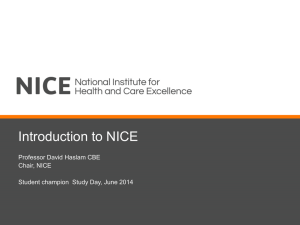SWL CE Bulletin Issue 24 Jun-Jul 2013
advertisement

SW London Primary Care Clinical Effectiveness Bulletin Edition No. 24: June and July 2013 Welcome to this Digest of best practice relevant to primary care distributed to all GP practices in South West London. This information is collated from national and local sources, with hyperlinks to the more detailed guidance within each section – simply [control + click] within the sections to follow the links to websites. AND Acupuncture is used in conjunction with other conventional treatments as part of a pain management programme. 2. NICE Clinical Guidelines & Public Health Guidelines Falls (CG161) This clinical guideline extends and replaces NICE CG21 (2004), offers evidence-based advice on preventing falls in older people, and is applicable to primary, community and secondary care services. New recommendations have been added about preventing falls in older people during a hospital stay. Falls cost the NHS an estimated £2.3 billion a year. Nearly 209,000 falls were reported in hospitals in England between 1 October 2011 and 30 September 2012. While the majority (97%) of these people experienced no or low harm, 90 patients died because of their falls, and around 900 patients experienced severe harm, such as hip fractures and head injuries. CONTENTS (Ctrl+Click to go to section) 1. South West London Effective Commissioning Initiative (SWLECI) 2. NICE Clinical & Public Health Guidelines 3. NICE Technology Appraisals and Other Guidance 4. Other News and Clinical Effectiveness information sources 1. South West London Effective Commissioning Initiative (ECI) Stroke rehabilitation (CG162) This guideline offers evidence-based advice on the care of adults and young people aged 16 years and older who have had a stroke with continuing impairment, activity limitation or participation restriction. It is aimed at improving outcomes for people who have a disability caused by a stroke. Thanks to improvements in stroke care, each year most of the 125,000 people in England, Wales and Northern Ireland who have a stroke survive but often at the cost of long-term disability. NICE says people should be given targeted therapy immediately after their stroke while staying in a dedicated stroke inpatient unit, to give them the opportunity to relearn old skills or get new ones. When they return home, they should receive care from a specialist community stroke team. The SW London Effective Commissioning Initiative (ECI), is driven by the need to ensure that NHS funded treatments are effective, evidence-based, provide value for money, and that access to them is equitable across the cluster. Please follow the link above for the 2013/14 ECI Policy Document. This month we showcase another ECI topic: Acupuncture for Non-Specific Low Back Pain (LBP). CCGs will only fund acupuncture if all of the following criteria are met under the following circumstances. A maximum of 10 sessions should be offered over a period of 12 weeks as a one-off treatment. Any additional treatments sessions will require prior approval for funding. Acupuncture is more effective if it is offered as an adjunct to other conventional treatments. The treatment may be offered in primary care. Criteria: Idiopathic pulmonary fibrosis (CG163) Idiopathic pulmonary fibrosis is a chronic, progressive disease in which the lungs become scarred. Each year around 4,000 adults in the UK are diagnosed with IPF with only 20% surviving for longer than five years. This clinical guideline offers evidence-based advice on the diagnosis and management of LBP exists for more than 6 months AND LBP is severe as assessed by one of the grading systems e.g. RMDQ AND All other conventional treatments such as exercise , pharmacological management, physiotherapy etc. have been tried without any improvement in symptoms for a minimum of 6 months Page 1 SW London Primary Care Clinical Effectiveness Bulletin Edition No. 24: June and July 2013 suspected idiopathic pulmonary fibrosis in adults. It recommends that healthcare professionals, particularly family doctors, should be aware of the symptoms of this disease (persistent cough, breathlessness and respiratory crackles) to make sure patients have access to chest X-rays and specialists so a prompt diagnosis can be made. NICE also recommends that as soon as a person is diagnosed with IPF, they should be assessed to see if their quality of life can be improved though exercise and education. Myocardial infarction with ST-segment elevation (CG167) This clinical guideline offers evidence-based advice on the care and treatment of adults with spontaneous onset of myocardial infarction with ST-segment elevation. It is applicable to ambulance, secondary care acute and tertiary care services. Varicose veins in the legs (CG168) This clinical guideline offers evidence-based advice on the diagnosis and management of varicose veins in adults aged 18 years and over, and is applicable to primary and secondary care acute services. NICE has recommended that some people with varicose veins, such as those causing pain and ulcers, should be offered alternatives to surgery which are less invasive with a much speedier recovery time. Many with varicose veins have no symptoms, but for some they can cause pain, aching or itching. Some can also develop into leg ulcers, which can be difficult to heal and can have a significant effect on their quality of life. Familial breast cancer (CG164) This clinical guideline updates and replaces NICE CG41. It offers evidence-based advice on the classification and care of people at risk of familial breast cancer. It also makes recommendations on genetic testing thresholds, surveillance and risk reduction and treatment strategies for people with a diagnosis of breast cancer and a family history of breast, ovarian or a related cancer. These areas are not covered by Early and locally advanced breast cancer (NICE CG80). Hepatitis B (chronic) (CG165) This covers the diagnosis and management of Hepatitis B in adults, young people and children. The NICE guideline covers: where adults, children and young people with chronic hepatitis B should be assessed; criteria for offering antiviral treatment; the efficacy, safety and cost effectiveness of currently available treatments; selection of first-line therapy; management of treatment failure or drug resistance; whether there is a role for combination therapy; when it is possible to stop treatment; and monitoring for treatment response, severity of fibrosis and development of primary liver cancer. It updates, replaces and/or incorporates the recommendations of all previous NICE Technology Appraisals in relation to drug treatments for Hep B. Tobacco harm reduction (PH45) The best way to quit smoking is to stop in one step. However, there are other ways of reducing the harm from smoking, even though this may involve continued use of nicotine. This guidance recommends harm-reduction approaches which may or may not include temporary or long-term use of licensed nicotine-containing products, and is especially aimed at those involved in providing advice about stopping smoking, including those working in smoking cessation services. BMI and waist circumference - black, Asian and minority ethnic groups (PH46) NICE says Body Mass Index, a standard core measure used to identify risk of conditions such as type 2 diabetes or heart disease, may be being applied wrongly to people from black, Asian and other minority ethnic groups. This guidance urges doctors, nurses and other healthcare workers to follow its new guidance to reduce the risks to people from minority ethnic groups of diseases linked to lifestyle and weight. Ulcerative Colitis (CG166) This clinical guideline offers evidence-based advice on the care and treatment of adults, children and young people with a diagnosis of ulcerative colitis, and is applicable to secondary and tertiary care services. Page 2 SW London Primary Care Clinical Effectiveness Bulletin Edition No. 24: June and July 2013 3. NICE Technology Appraisals and Other Guidance commissioning groups, the cornerstone of the coalition government's NHS reforms. The report focuses on six CCGs and reveals that many GPs don't currently have a strong sense of ownership of their local CCGs. This table lists eight TAs published in June and July 2013. NB: For detailed recommendations, please access via the hyperlinks below. TA287 Pulmonary embolism and recurrent venous thromboembolism - rivaroxaban (TA287) Jun 2013 TA288 Type 2 diabetes - Dapagliflozin combination therapy (TA288) Jun 2013 TA289 Myelofibrosis (splenomegaly, symptoms) Jun - ruxolitinib (TA289) 2013 TA290 Overactive bladder - mirabegron (TA290) Jun 2013 TA291 Gout (tophaceous, severe debilitating, chronic) - pegloticase (TA291) Jun 2013 TA292 Bipolar disorder (adolescents) aripiprazole (TA292) Jul 2013 TA293 Thrombocytopenic purpura eltrombopag (TA293) Jul 2013 TA294 Macular degeneration (wet age-related) - aflibercept (1st line) (TA294) Jul 2013 Co-ordinated care for people with complex chronic conditions This King’s Fund project involves an in-depth examination of approaches to care coordination undertaken in primary care settings in different parts of the UK. The project is being undertaken with five case study sites who have developed innovative primary carebased approaches to care co-ordination for people with complex chronic conditions. Each final case study includes an organogram showing the care planning/co-ordination process, patient stories and a video highlighting the work of the team. New Clinical Knowledge Summaries NICE launches new version of the Clinical Knowledge Summaries (CKS) ’Eyes on Evidence’ (NHS Evidence) This monthly newsletter covers major new evidence as it emerges, with an explanation about what it means for current practice. It is possible to access all previous NICE guidance by clicking on the hyperlinks below: Clinical Guidelines Public Health Guidance Technology Appraisals Interventional Procedure Guidance Diagnostic Guidance Medical Technologies Guidance Quality Standards New Evidence Updates on NICE guidance Guidance is continually under review in the light of new scientific evidence. Have your say! We welcome your comments and suggestions regarding this regular publication. Please contact any member of the editorial team. Previous editions of this Bulletin can be found at the SW London Public Health Network. 4. Other News and Clinical Effectiveness information sources Avoid drug treatment for children and young people with moderate ADHD NICE advises against using drugs as a firstline treatment for children and young people with moderate attention deficit hyperactivity disorder (ADHD), as latest figures suggest a sharp rise in the number of drugs prescribed for the condition…. Editorial Team: Tracy Steadman, Public Health Croydon Tracy.Steadman@croydon.gov.uk Alastair Johnston, Public Health Wandsworth AJohnston@wandsworth.gov.uk Usman Khan, Public Health Richmond, Usman.Khan@richmond.gov.uk Livia Royle, Public Health Kingston Livia.Royle@rbk.kingston.gov.uk How are clinical commissioning groups evolving? This week the Kings Fund published new research into the early development of clinical Page 3







